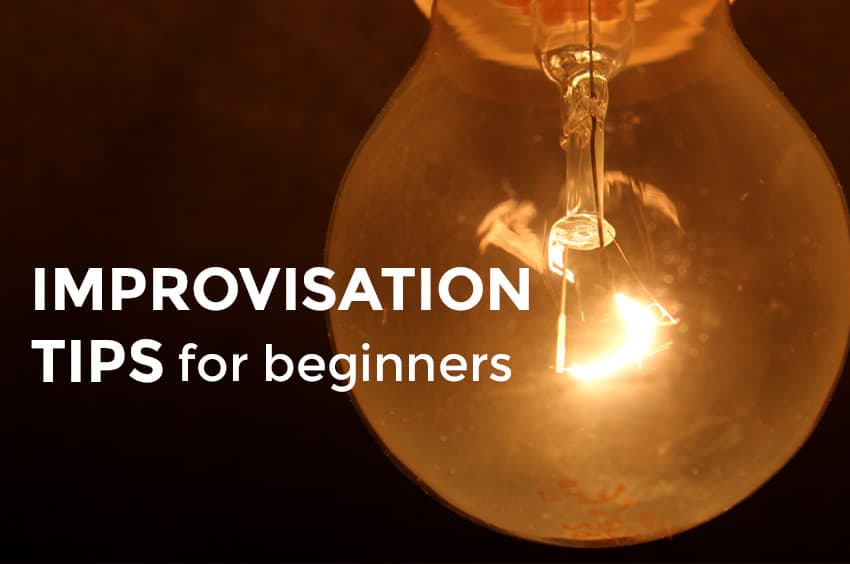Begin Putting the ‘Pro’ in Musical Improvisation

Perhaps the ultimate display of personal musicianship and expression, improvisation is a fantastic component to any developing musician’s study. Learning to play spontaneously isn’t easy, and it’s certainly a skill built on trial and error. However, there are a few things beginners can do to aid in their mastery of musical improvisation.
First, you might be thinking, “I’m not a jazz guy, what do I need to practice improvisation for?”From Bach to Beethoven, improvisation has a storied history in classical music, allowing composers to show off their skills and attract attention and admirers. A recent study has even suggested that musicians who train in improvisation are able to unlock their innermost creativity. When we improvise, the more analytical, self-monitoring parts of our brain deactivate, allowing the creative, spontaneous areas to light up with activity. This means that improvisation actually exercises new areas of the brain, how cool is that?
We’ve pulled a few of our top tips to release each of our inner improvisational abilities. Warm up, pick a theme, ready, set, improvise!
1. Know Your Fundamentals
Before you even begin trying your hands at musical improvisation, it’s infinitely helpful to have a working knowledge of music theory. Your keys, scales, chords and time signatures are the tools of your improvisation toolbox, without which it’ll be pretty difficult, if not impossible, to create the sound you want. Know your scales forward and backward, major and minor, blues, pentatonic. You’ll start to recognize what notes complement which keys.
A good go-to piano exercise is to play chords with your left hand, while using your right hand to create a simple melody using those same chord tones. Likewise, you can expand into scale tones matching the key you’re playing in. Especially when you’re just starting out, it’s a great help to ‘think’ a little more when improvising, so that later on your built-up intuition can take over!
2. Train Your Ear
Hand-in-hand with your music theory knowledge is being able to instantly recognize essential elements of melody and harmony in real time. We really like the ear training exercises at musictheory.net.
If you’re already able to play by ear, you’re one step ahead of the game! Practice playing along with recordings of your favorite songs, then, once you have that down, try playing the melody by memory alone. Next, start experimenting with the melody. Don’t worry about changing the piece beyond recognition, but rather add slight alterations here and there, working toward a sound you like. Or, start off playing a piece of sheet music, then gradually stray from the melody and make up your own. In addition to the notes, test variations in phrasing, rhythm and dynamics.
A really fun activity to help improve your musical improvisation is to listen to as many great improvisers as you can! Download albums by Charlie Parker, Duke Ellington, Miles Davis, Stevie Ray Vaughan, Grateful Dead… and the countless other infamous improvisors throughout history.
3. Don’t Fret Over Mistakes
One of the very most important, and sometimes most difficult, parts of learning how to improvise is learning how to let go of the need for perfection. If you hit an unforgiving note, just play on! Remember that even your musical idols were once novices, and that each of us has to start somewhere.
Experimenting without self-judgement is how we break out of our comfort zones and learn new skills. Have fun, laugh and leave criticism at the door when you sit down to practice your improvisation.
4. Record Yourself
Just as with any practice session, reviewing what you’ve just played can provide worlds of helpful insight. Often what you hear while playing is slightly different that what your audience might hear, so listening to a recording of your improv practice can either encourage you to continue as you are, or persuade you to make a few tweaks.
Make note of what worked or didn’t work, don’t get discouraged by mistakes, but think of how much more aware you’ll be the next time. Also keenly notice which phrases/passages/patterns seem to really work, continue honing them, memorize and add them to your improvising toolbox.
5. Be Aware
Once the big day comes and you’re improvising with other musicians in a band or playing in front of a live audience, be sure to engage with your surroundings! Make visual contact with your bandmates, keep an eye on the audience, and really be present in that moment.
Play with emotion and passion, and tell a story that transcends words alone. One of the very coolest things about improvisation is that your message is completely up to YOU.
Do you have additional tips to help novice improvisers? Are there any particular tools you’ve found especially helpful in honing your improvisational skills? Share your insights & expertise on social media and tag us!

